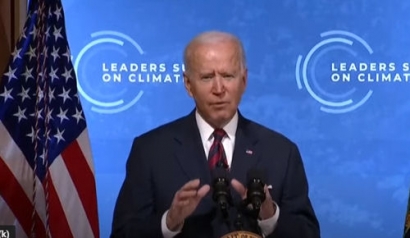
The announcement is part of the president’s focus on building back better in a way that will create millions of good-paying, union jobs, ensure economic competitiveness, advance environmental justice, and improve the health and security of communities across America.
On his first day in office President Biden fulfilled his promise to rejoin the Paris Agreement and set a course for the United States to tackle the climate crisis at home and abroad, reaching net zero emissions economy-wide by no later than 2050. As part of re-entering the Paris Agreement, he also launched a whole-of-government process, organized through his National Climate Task Force, to establish this new 2030 emissions target – known as the “nationally determined contribution” or “NDC,” a formal submission to the United Nations Framework Convention on Climate Change (UNFCCC). The announcement is the product of this government-wide assessment of how to make the most of the opportunity combating climate change presents.
Creating jobs and tackling climate change go hand in hand – empowering the U.S. to build more resilient infrastructure, expand access to clean air and drinking water, spur American technological innovations, and create good-paying, union jobs along the way.
The target builds on leadership from mayors, county executives, governors, tribal leaders, businesses, faith groups, cultural institutions, health care organizations, investors, and communities who have worked together to ensure sustained progress in reducing pollution in the United States.
Building on and benefiting from that foundation, America’s 2030 target picks up the pace of emissions reductions in the United States, compared to historical levels, while supporting Biden’s existing goals to create a carbon pollution-free power sector by 2035 and net zero emissions economy by no later than 2050.
There are multiple paths to reach these goals, and the U.S. federal, state, local, and tribal governments have many tools available to work with civil society and the private sector to mobilize investment to meet these goals while supporting a strong economy.
This target prioritizes American workers. Meeting the 2030 emissions target will create millions of good-paying, middle class, union jobs – line workers who will lay thousands of miles of transmission lines for a clean, modern, resilient grid; workers capping abandoned wells and reclaiming mines and stopping methane leaks; autoworkers building modern, efficient, electric vehicles and the charging infrastructure to support them; engineers and construction workers expanding carbon capture and green hydrogen to forge cleaner steel and cement; and farmers using cutting-edge tools to make American soil the next frontier of carbon innovation.
"The health of our communities, well-being of our workers, and competitiveness of our economy requires this quick and bold action to reduce greenhouse gas emissions," a statement from the White House said.
The statement said the U.S. must:
The target is consistent with the President’s goal of achieving net-zero greenhouse gas emissions by no later than 2050 and of limiting global warming to 1.5 degrees Celsius, as the science demands.

